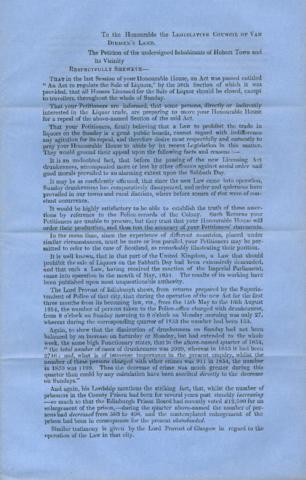Identity area
Reference code
Title
Date(s)
- c1855 (Creation)
Level of description
Item
Extent and medium
4 copies of document
Context area
Name of creator
Biographical history
George Washington Walker (1800-1859), Quaker, shopkeeper and humanitarian, was born on 19 March 1800 in London, the twenty-first child of John Walker (1726-1821) by his second wife, Elizabeth, née Ridley. Because of the death of his mother and the absence of his aged father engaged in the saddle trade in Paris, he was brought up by his grandmother in Newcastle. He was educated by a Wesleyan schoolmaster near Barnard Castle, and apprenticed in 1814 to a linen draper. Impressed by the probity and wisdom of his Quaker employers and James Backhouse of York, a leading Quaker minister, he left the Unitarian persuasion of his family in 1827 and became a member of the Society of Friends. The next year he formed the first Temperance Society in Newcastle.
For more information see http://adb.anu.edu.au/biography/walker-george-washington-2764
Immediate source of acquisition or transfer
Content and structure area
Scope and content
Copy of an uncompleted petition from the inhabitants of Hobart Town and its vicinity to the Honourable the Legislative Council of Van Diemen's Land. Petitioners therefore pray that the 38th Section of the Licensing Act, commonly known as the " Sunday Clause" may not be repealed.
Appraisal, destruction and scheduling
Accruals
System of arrangement
Conditions of access and use area
Conditions governing access
Open for research
Conditions governing reproduction
This material is made available for personal research and study purposes under the University of Tasmania Standard Copyright Licence. For any further use permission should be obtained from the copyright owners. For assistance please contact Special.Collections@utas.edu.au
When reusing this material, please cite the reference number and provide the following acknowledgement:
“Courtesy of the UTAS Library Special & Rare Collections”
Language of material
Script of material
Language and script notes
Physical characteristics and technical requirements
Finding aids
Existence and location of originals
Existence and location of copies
Related units of description
Alternative identifier(s)
Access points
Subject access points
Place access points
Name access points
Genre access points
Description identifier
Institution identifier
Rules and/or conventions used
Status
Level of detail
Dates of creation revision deletion
Language(s)
Script(s)
Sources
Digital object metadata
Latitude
Longitude
Media type
Text
Mime-type
application/pdf


